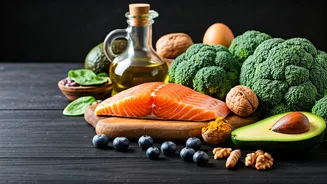Fatty Fish Power
Fatty fish, such as salmon, trout, and sardines, are rich in omega-3 fatty acids, crucial for brain health. These fats are building blocks for brain cells
and play a key role in memory and learning. Research shows that people who consume more omega-3s often have better cognitive performance. Specifically, Docosahexaenoic acid (DHA), a type of omega-3, makes up a significant portion of the brain's structure. Regular consumption of fatty fish may also help reduce the risk of cognitive decline with age. To reap these benefits, aim to include fatty fish in your diet at least twice a week. Prepare them through baking, grilling, or steaming to maximize their nutritional value. Consider adding supplements if fish intake is challenging, but always consult a healthcare professional for advice on dosage and suitability.
Coffee's Caffeine Kick
Coffee, a morning staple for many, offers more than just an energy boost; it's also a cognitive enhancer. Caffeine, the active ingredient, increases alertness, improves concentration, and boosts overall mental performance. Studies suggest that moderate coffee consumption can also help with memory consolidation, making it easier to retain information. In addition to caffeine, coffee contains antioxidants that protect the brain from damage. While the benefits are clear, it's essential to consume coffee in moderation. Excessive caffeine can lead to anxiety, insomnia, and other negative side effects. Pay attention to how coffee impacts your body and adjust your intake accordingly. Experiment with brewing methods to find your preferred taste and strength, but always consider the overall effect on your daily cognitive function.
Blueberries' Brain Boost
Blueberries, packed with antioxidants, are exceptional for brain health. Antioxidants combat oxidative stress and inflammation, both of which contribute to brain aging and cognitive decline. The antioxidants in blueberries, particularly anthocyanins, cross the blood-brain barrier and directly impact the brain. Research has linked blueberry consumption to improved memory and processing speed. They can also enhance the brain's communication processes. The best way to enjoy blueberries is fresh, but frozen berries offer the same benefits. Add them to your morning cereal, smoothies, or enjoy them as a snack. Their versatility makes them an easy addition to a balanced diet aimed at supporting brain function and overall well-being. Regular consumption may provide noticeable improvements over time.
Turmeric's Curcumin Power
Turmeric, a spice popular in Indian cuisine, contains curcumin, a powerful antioxidant and anti-inflammatory compound. Curcumin crosses the blood-brain barrier and can directly benefit brain cells. It has been shown to improve memory and boost mood. Curcumin helps to clear amyloid plaques, which are associated with Alzheimer's disease. To enhance the absorption of curcumin, combine turmeric with black pepper, as piperine in black pepper increases curcumin bioavailability. Use turmeric in your cooking, add it to smoothies, or take it as a supplement. It’s also often used in golden milk, a warm beverage that can easily be incorporated into your daily routine. With continued usage, turmeric can have significant impacts on cognitive function and overall brain health.
Broccoli's Vitamin K
Broccoli is rich in vitamin K, essential for brain health. Vitamin K helps produce sphingolipids, a type of fat that packs densely into brain cells. This strengthens and supports the overall structure of the brain. Broccoli also contains antioxidants that protect the brain from damage. Regular consumption of broccoli has been linked to improved cognitive function and memory. Include broccoli in your diet through various culinary methods. Steam, roast, or add it to stir-fries or salads. It can be easily incorporated into your meals for a boost in cognitive function. The vitamins and nutrients present in broccoli can also aid in other body functions. Broccoli, as a nutrient-rich vegetable, becomes a key player in promoting overall brain health and maintaining cognitive performance.
Pumpkin Seeds' Zinc
Pumpkin seeds are packed with zinc, iron, magnesium, and copper—all critical for brain health. Zinc is particularly important for nerve signaling. Zinc deficiency can impair cognitive functions and memory. Iron helps in oxygen transport to the brain, supporting optimal brain function. Magnesium plays a role in learning and memory. Copper also contributes to the regulation of nerve signals. Consuming pumpkin seeds provides a rich source of these essential nutrients. They are easy to incorporate as a snack, added to salads, or incorporated into various recipes. Regular consumption may lead to notable improvements in cognitive performance. Always aim for a balanced diet that includes these kinds of seeds to ensure long-term brain health and overall well-being.
Dark Chocolate's Flavonoids
Dark chocolate contains flavonoids, powerful antioxidants that improve brain function. Flavonoids increase blood flow to the brain, which in turn enhances cognitive performance and memory. They also help reduce inflammation, which protects brain cells from damage. Dark chocolate can boost mood and focus, providing a short-term cognitive lift. The higher the cocoa content, the more flavonoids it contains. Look for dark chocolate with at least 70% cocoa. Consume in moderation, as dark chocolate is also high in calories. A small piece of dark chocolate can provide a delicious way to support brain health. It offers both the enjoyment of taste and the benefits of improved cognitive function.
Nuts and Seeds' Nutrients
Nuts and seeds are great sources of Vitamin E, which is an antioxidant that protects the brain. They also contain healthy fats and other essential nutrients vital for brain health. Some studies show that consuming nuts may improve cognitive function and reduce the risk of cognitive decline with age. Walnuts, in particular, are considered excellent for brain health. Include a variety of nuts and seeds in your diet, such as almonds, walnuts, flaxseeds, and chia seeds. Enjoy them as a snack, add them to salads, or incorporate them into your meals. Keep in mind that nuts and seeds are calorie-dense. Maintaining a moderate intake of these brain-boosting foods will promote long-term cognitive health.
Oranges' Vitamin C
Oranges are rich in Vitamin C, which is an antioxidant essential for protecting the brain. Vitamin C helps to fight off free radicals that can damage brain cells. It also supports overall cognitive function and helps reduce age-related cognitive decline. Vitamin C plays a role in producing neurotransmitters, which are crucial for communication between brain cells. Consume oranges as a snack, drink freshly squeezed orange juice, or add orange segments to your salads. Incorporating oranges into your daily diet helps boost cognitive function. By providing a rich source of vitamin C, these fruits are important for both physical and cognitive health.
Eggs' Choline Boost
Eggs are an excellent source of choline, a nutrient vital for brain health. Choline helps produce acetylcholine, a neurotransmitter essential for memory and communication between brain cells. Regular choline intake has been linked to improved memory and cognitive performance. Eggs also contain other nutrients beneficial for brain health, such as vitamins B6 and B12, and folate. Eat eggs as part of a balanced diet. Incorporate them in your breakfast or any meal of the day. They are easy to cook and provide a quick way to support your brain health. Regular consumption may help maintain optimal cognitive function and overall well-being.




















